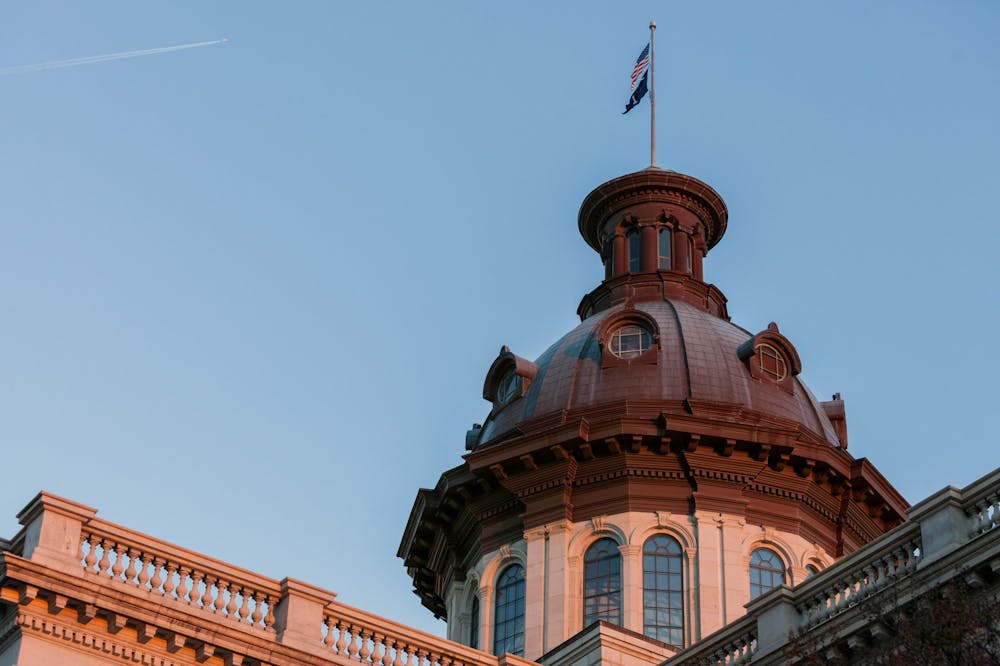USC’s budget presentation on Tuesday to the Ways and Means Higher Education Subcommittee in the S.C. House of Representatives was a demonstration of how both the USC administration and the General Assembly are failing to properly run our university.
The meeting is one of the first steps the General Assembly takes each year to build its annual state budget — an effort led by the Ways and Means Committee in the House of Representatives and the Finance Committee in the Senate.
It was a chance for interim university President Harris Pastides to brag about USC’s accomplishments and to try to convince the S.C. House of Representatives to fund the USC system as much as possible.
This year's meeting was tense, with Pastides sometimes inaccurately answering pointed questions from Reps. Gilda Cobb-Hunter, D-Orangeburg and Kirkman Finlay, R-Richland.
Many of these questions suggest that the General Assembly has no real desire to ever properly fund USC: Both Cobb-Hunter and Finlay asked if USC has “patched things up” with USC donors Darla Moore and Lou Kennedy.
On its face, it seems like an innocuous question — after all, they’re both big spenders when it comes to higher education — but the fact that private donors are so essential to USC’s bottom line is tragic.
No institution that calls itself public should ever be in the position where the feelings of two private individuals can determine its financial stability.
When Cobb-Hunter asked Pastides about USC’s funding requests for maintaining or expanding need-based financial aid, he answered by saying “we will go to donors,” and that the school will suggest to donors that they match the state’s funding for need-based aid in their donations.
Cobb-Hunter responded with “that’s great," but it really isn't.
In fact, it’s unacceptable for the General Assembly to outsource funding for something as important as need-based scholarships to private individuals, especially when the state has a massive budget surplus this year.
The hearing also highlighted another one of USC’s biggest problems: A lack of racial diversity.
During an exchange about USC’s level of diversity between Finlay and Pastides about halfway through the meeting, Finlay asked “You’re saying to me that the number of African American students at USC-Columbia has consistently grown?” Pastides responded, “Absolutely, every year.”
That’s not true. In fact, the amount of African American students at USC-Columbia has consistently declined.
According to data from USC’s Office of Institutional Research, Assessment, and Analytics, during fall 1993 — the earliest year which the office provides data for — there were 3,753 African American students at USC Columbia. In fall 2001, that number fell to 3,595, then to 3,440 in fall 2011 and 3,384 in fall 2021.
This decline in the number of Black students happened while the campus’s overall population increased, meaning that the percentage of Black students in the student body was falling even faster than the raw numbers.
Pastides acknowledged this percentage decline and said in the meeting that “the reason that the overall percentage has gone down is that when the state of South Carolina cut our funds, we recruited and enrolled more out of state applicants, who were almost all white, from other parts of the country.”
It’s worth asking why USC students from outside of S.C. are “almost all white”, — it’s not like there aren’t people of color in other states.
Pastides also responded inaccurately to a question from Cobb-Hunter about changes to USC’s sexual misconduct policies. He said, “we had an outside review by a law firm that said the policies were fine, but that we’ve revamped the personnel, and so we have a significant new reporting structure, we’re in the process of recruiting senior people.”
Saying that USC’s sexual misconduct policies are “fine” isn’t true, nor is it supported by the reviews and reports produced over the past year.
The Title IX Task Force’s report, released on July 1, 2021, found that “the current reporting system is difficult to navigate, and the process of reporting is an adverse and potentially re-traumatizing experience” and that “few reported cases are formally investigated.”
The report also found that “there is inconsistency in documentation and execution of discipline for faculty and staff” and that “there is a lack of continual review of risk to the complainant, which may undermine measures to protect against further harassment and retaliation.”
Most disturbingly, it found that “the culture of the institution and students does not reflect a shared commitment to addressing (sexual harassment and violence).”
The Audit and Advisory Services Report also found multiple shortcomings in university procedures, saying that changes needed to be made for faculty disciplinary procedures, and that the university should conduct a “comprehensive review” of discrimination and harassment policies and review them if necessary.
If Pastides thinks those conclusions reflect that we are on our way to having an "exemplary Title IX program,” as he put it, then it’s hard to imagine what he wouldn’t be content with.

